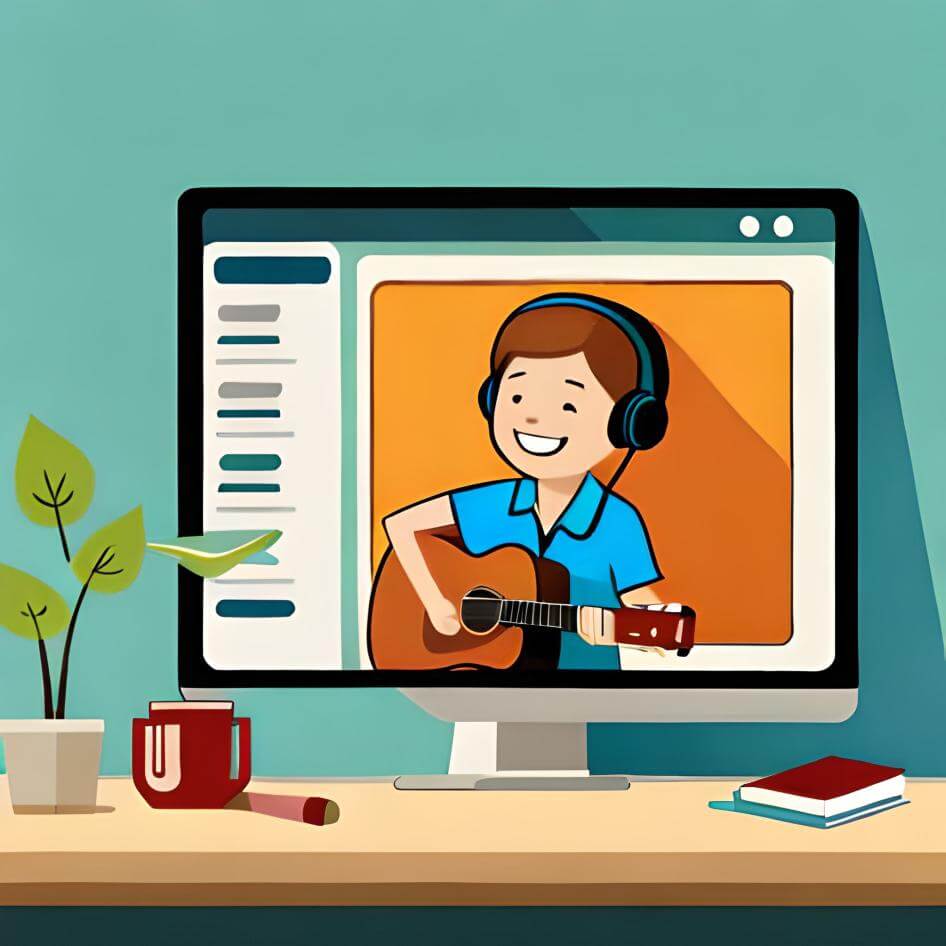 Growing your music teaching business requires two things: getting more students and keeping the students you already have. Word-of-mouth advertising stands out as a powerful and organic method for building a thriving music school. In this article, we will delve into the essence of word-of-mouth marketing, explore its many benefits for music teachers, and provide practical strategies to harness its potential for success. After reading, you’ll understand why word-of-mouth marketing must be a big part of your music lesson marketing plan.
Growing your music teaching business requires two things: getting more students and keeping the students you already have. Word-of-mouth advertising stands out as a powerful and organic method for building a thriving music school. In this article, we will delve into the essence of word-of-mouth marketing, explore its many benefits for music teachers, and provide practical strategies to harness its potential for success. After reading, you’ll understand why word-of-mouth marketing must be a big part of your music lesson marketing plan.
What is word-of-mouth marketing?
Word-of-mouth marketing is a form of promotion where people share positive experiences, recommendations, or information about a product, service, or business with others in their social circle, leading to organic and unpaid promotion. For private music teachers, word of mouth can be effective because parents of children who take music lessons often know other parents. If your students have an excellent experience, parents naturally share their experience with their friends. Unlike traditional advertising, word-of-mouth relies on authentic, personal interactions to promote a service.
What are some benefits of word-of-mouth marketing for music teachers?
There are many benefits to word-of-mouth marketing that music teachers should consider. Word-of-mouth marketing should be an ongoing focus for a music teacher’s overall marketing strategy.
Word-of-mouth conveys trust and credibility
Recommendations from friends, family, or acquaintances carry a higher level of trust compared to traditional advertising, enhancing overall credibility. When current or former students suggest a music teacher to others, it lends credence to the recommendation. Potential students are more inclined to trust the viewpoints of those who have direct experience with the teacher. Positive word-of-mouth often arises from the teacher’s effective imparting of musical knowledge and skills. When students can affirm their progress and accomplishments under a specific teacher, it is tangible social proof of their competence, reliability, professionalism, and dedication to their students.
Word-of-mouth is cost-effective
Word-of-mouth marketing is a low-cost or even free way to promote your music lesson business, as it relies on satisfied customers spreading the word. Satisfied students and their positive experiences primarily drive it. Unlike traditional advertising methods that often involve significant costs for placements or promotions, word-of-mouth happens organically, relying on existing students’ natural enthusiasm and satisfaction.
Word-of-mouth helps you get new students and keep students you already have
The rate of students leaving your music lessons over a given period of time is called your churn rate. The rate of new students starting music lessons over that same period of time is your growth rate. Your student load will plateau if the churn rate and growth rate are equal. It’s always best to focus on keeping students rather than replacing them, but word-of-mouth addresses both issues. In pursuing word-of-mouth, teachers tend to fix the reasons students give up on music lessons; you increase the chances of getting word-of-mouth advertising.
Word-of-mouth can lead to more lead conversions
Word-of-mouth marketing, or referral marketing, outshines traditional channels for music teachers, yielding higher conversions. Unlike traditional advertising, personalized recommendations from satisfied students, friends, or family build trust. Statistics reveal a fourfold increase in the likelihood of people using a service when referred by a friend. Potential students and parents are usually swayed by authentic, positive experiences shared by those benefiting from a music teacher’s expertise. This trust and social proof address skepticism, creating a receptive audience. Word-of-mouth’s organic and authentic nature leads to increased conversions as students confidently choose a teacher based on genuine recommendations.

Do you want to get more students and grow your music teaching business?
MusicTeacherNotes is music teacher software that helps music teachers get more students and manage all aspects of their music teaching business! Every teacher who registers for a free account gets a Music Teacher Directory listing, even if they never upgrade. There is no risk in joining.
Word-of-mouth marketing for music teachers inherently possesses a targeted reach
Recommendations and endorsements are often shared within specific communities, whether among friends, family, or fellow musicians. This organic form of advertising ensures that the message reaches those who share a common passion for music, creating a natural alignment between the teacher’s services and the interests of the audience. Unlike broad-reaching traditional marketing methods, word-of-mouth leverages existing relationships and networks, delivering the message directly to individuals more likely to resonate with and respond positively to the music teacher’s unique teaching style and approach.
Word-of-mouth has a lasting impact
Positive word-of-mouth experiences have a lasting impact on a music teacher’s reputation. When people share their positive encounters through personal recommendations, it creates a sustained positive perception. This enduring effect influences decisions, solidifying the teacher’s reputation and leaving a lasting impression on potential students, shaping their reputation over time.
Word-of-mouth builds brand awareness
When people chat about music lessons and share positive experiences and recommendations, they naturally help spread the teacher’s brand. This increased visibility in personal circles creates a ripple effect, making more people familiar with the teacher’s name and reputation. Ultimately, word-of-mouth plays a crucial role in building and strengthening the teacher’s brand awareness in the community and beyond.
Word-of-mouth provides valuable feedback and leads to continuous improvement
As recommendations and experiences are shared, the immediate feedback loop helps teachers assess the effectiveness of their music lesson services. This direct communication allows a quick response to students’ needs. By listening to word-of-mouth experiences, music teachers adjust their methods, content, and overall approach, creating a dynamic and responsive learning environment. This ongoing process ensures teachers stay attuned to evolving student needs, fostering continuous improvement in their music education services.
Word-of-mouth fosters an emotional connection between customers and the brand
As people share their experiences and recommendations, a story unfolds, connecting with potential students on a personal level. This emotional bond becomes part of the teacher’s brand, shaping how it’s perceived and remembered. Genuine recommendations and shared stories foster trust and relatability, enabling students to form a deeper connection with the music teacher.
Word-of-mouth marketing can lead to rapid spread
Information, recommendations, and experiences can quickly spread across social networks and online platforms, reaching a wide audience. In that sense, word-of-mouth marketing is intertwined with social media marketing. The power of online sharing enables word-of-mouth to go beyond geographical boundaries, connecting music teachers with a diverse audience. This rapid sharing not only boosts the visibility of the teacher’s offerings but also enhances the potential for positive recommendations to impact a broad audience, strengthening the effectiveness of word-of-mouth marketing.
Word-of-mouth marketing is critical for new music teachers
Word-of-mouth marketing is crucial for new music teachers with limited students and a tight budget. Unlike established teachers, newcomers may struggle with traditional advertising. Prioritizing word-of-mouth strategies allows them to leverage authentic endorsements. Encouraging satisfied students to share their experiences and building strong community connections become vital steps for new teachers to expand their reach, build trust, and establish a foundation for growth.
Positive word-of-mouth functions as a compelling form of social proof
Renowned psychologist Robert Cialdini’s book “Influence” highlights several key factors that motivate people to take action. One of those factors is social proof. Social proof is the psychological concept where people follow the actions or decisions of others as a form of reassurance or validation, commonly seen in customer reviews, testimonials, and endorsements, used by businesses to build trust and credibility. When individuals share their favorable experiences with a music teacher, it serves as social proof that the music teacher is good. Social proof becomes a driving force that encourages others to explore the music teacher’s offerings.
Ten strategies a music teacher can employ to generate word-of-mouth advertising for their lessons
Now that you’re aware of the advantages music teachers gain through word-of-mouth advertising, here are practical tips and strategies you can implement to enhance the probability that students and parents will actively share information about the music lessons you offer with their friends.
#1: Deliver Outstanding Lessons
Providing top-notch music lessons is crucial for music teachers seeking positive word-of-mouth. By consistently delivering high-quality lessons and guiding students to tangible progress, teachers naturally foster an environment conducive to favorable recommendations. When students acknowledge the value of their learning experience, they’re more likely to share their satisfaction. This authentic endorsement, stemming from the teacher’s commitment to excellence, becomes a potent catalyst for word-of-mouth advertising, extending the teacher’s influence within their community and beyond.
#2: Build Strong Relationships
Building strong relationships is a fundamental strategy for music teachers aiming to encourage word-of-mouth advertising. Creating a strong connection with students and their families is crucial for a positive and memorable experience. By establishing trust, respect, and effective communication, teachers foster an environment where students and families are motivated to share their satisfaction. Prioritizing relationship-building improves the learning atmosphere and sparks organic, positive recommendations, boosting the teacher’s reputation and word-of-mouth influence within their educational community.
#3: Offer Referral Incentives
Encouraging word-of-mouth through referral incentives is a powerful strategy for music teachers. Teachers show appreciation and create a mutually beneficial system by rewarding current students who refer new ones with discounts, free lessons, or other enticing incentives. This initiative motivates existing students to recommend music lessons actively. It attracts potential students, forming a positive cycle of referrals that expands the reach and impact of word-of-mouth advertising for the music teacher.
#4: Showcase Student Success
Highlighting student success is a powerful strategy for music teachers looking to boost word-of-mouth advertising. By actively showcasing student achievements in recitals, performances, or online platforms, teachers demonstrate the effectiveness of their teaching methods. This serves as proof of the positive impact on students’ musical journeys, providing concrete examples. These success stories become compelling narratives that resonate with potential students, instilling confidence in the teacher’s abilities and encouraging word-of-mouth recommendations as individuals witness the impressive progress achieved by those under their guidance.
#5: Utilize Social Media
Social media can help music teachers tap into word-of-mouth marketing. Teachers effectively showcase their expertise and connect with potential students by sharing posts, videos, and testimonials across different platforms. This digital presence expands the reach of their teaching and fosters dynamic interactions with the audience. Social media becomes a lively space to share success stories, demonstrate teaching methods, and encourage conversations, creating a platform for word-of-mouth recommendations to spread organically within online communities. The strategic use of social media enhances the teacher’s visibility and fosters an environment where positive word-of-mouth can thrive.
#6: Collaborate with Schools
Collaborating with local schools is a strategic move for music teachers aiming to expand their word-of-mouth influence. Through partnerships, teachers can offer workshops, presentations, or after-school programs, gaining exposure to students and parents in the school community. This collaborative effort boosts the teacher’s visibility and establishes a direct connection with potential students and their families. Teachers actively engage in the educational landscape by showcasing expertise and sharing a passion for music education, building a positive reputation that can naturally spread through word-of-mouth within the school community and beyond.
#7: Attend Community Events
Active participation in community events is a proactive strategy for music teachers looking to leverage word-of-mouth marketing. By attending local events, fairs, or workshops, teachers can network with potential students and raise awareness about their teaching services. This direct engagement establishes a tangible presence in the community, allowing teachers to interact with individuals interested in music education. Through these interactions, teachers effectively communicate their teaching approach, passion, and expertise, laying the groundwork for positive word-of-mouth referrals. Actively immersing oneself in community events is a dynamic way to build a positive reputation, as attendees may naturally share their experiences and recommendations, contributing to the organic spread of word-of-mouth advertising.
#8: Engage with Online Reviews
Music teachers should encourage happy students to share positive experiences on platforms like Google, Yelp, and music forums to enhance their online presence. These testimonials act as social proof, building a positive online reputation that influences potential students’ decisions. Utilizing platforms like Google My Business (GMB) for local searches, where students can leave reviews, becomes a powerful tool for attracting new students and broadening a teacher’s reach.
#9: Create Informative Content
Creating informative content is a strategic move for music teachers aiming to strengthen their word-of-mouth influence. Teachers establish themselves as authorities by crafting blog posts, recording videos, or hosting webinars with valuable insights on music education. This content showcases their expertise and becomes a valuable resource for students and enthusiasts. Building credibility through informative content contributes to a positive reputation, motivating individuals to share the valuable insights gained from the teacher. As this knowledge-sharing becomes linked to the teacher’s identity, it acts as a powerful catalyst for organic word-of-mouth recommendations, expanding the reach and impact of their teaching within the broader community of music enthusiasts.
#10: Provide Exceptional Customer Service
Providing exceptional customer service is imperative for music teachers looking to encourage word-of-mouth referrals. Teachers leave a lasting positive impression by consistently going above and beyond to meet the needs of both students and their families. This commitment enhances the overall experience, creating satisfaction that resonates with families. A personalized approach to customer service establishes a strong foundation for word-of-mouth recommendations, as individuals are more likely to share their positive experiences. By consistently exceeding expectations, music teachers build a positive reputation and create a natural pathway for satisfied students and families to become advocates, organically expanding the reach and impact of word-of-mouth advertising.
Conclusion
Word-of-mouth marketing is just one part of your overall music lesson marketing plan, but it tends to be one of the most important. If students and parents aren’t referring you to their friends, you might have a problem that you need to address. By fixing problems, you get referrals and keep your existing students long-term. Delivering outstanding lessons, showcasing student success, and engaging offline and online unlock positive recommendations. Understanding the benefits of word-of-mouth marketing and embracing these strategies unlocks boundless success for you music teaching business.

 Do you want to get more students and grow your music teaching business?
Do you want to get more students and grow your music teaching business?